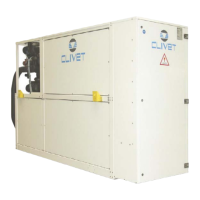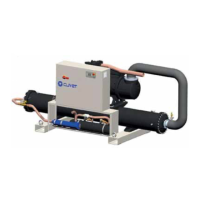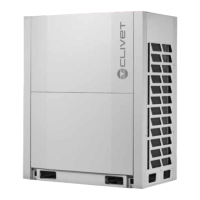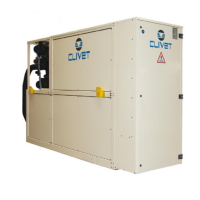12 MSE-SC 65D-180F M43X41C6-03
5.3 General description
The sizing of the refrigerating connection lines is of extreme importance for the system operating and reliability.
The diameter of the connection between the two units is function of distances, dierences in level and curve number; it has so to be calculated
by a qualied technician.
Incorrect sizing may damage the compressor or aect cooling capacity.
•
the operations must be performed by an expert refrigerator technician
•
use only a copper pipe for chiller operating
•
pipes must be perfectly clean (perform a cleaning with nitrogen or dry air before connecting the pipes to the two units) and without
humidity to allow a good vacuum operation
•
pipes must not to be too much long and with too much curves
•
for a good eciency do not perform curves with a radium too much short and avoid the pipe crushing
•
to allow the vacuum and charge operations install service ttings on pipes (if the unit is not tted with taps with service ttings)
5.4 Risk of explosion
When you install cut-o devices (solenoid valves, cocks, etc.), be aware that they may cause traps for refrigerant in the form of closed zones
upstream and downstream where the refrigerant cannot freely expand.
In this situation, if there is an increase in temperature (due to exposure to the sun, proximity of pipes or sources of heat), the expansion of the
trapped gas may cause the refrigeration pipes to explode.
Evaluate whether safety valves can be installed, especially in the liquid pipes that are most exposed to this risk.
5.5 Supply line
Insulate only if you want to prevent burns due to accidental contact.
5.6 Liquid line
The liquid line must be insulated if it is exposed to the sunlight or it crosses zones with a temperature higher than the external one, otherwise
it can be free.
Avoid excessive diameters to not cause an excessive refrigerant charge.
The solenoid valve avoids dangerous gas leaks when the unit is o; the installation is always recommended, above all with pipes particularly
long.
It has to be positioned near the thermostatic valve.
5.7 Liquid receiver
The liquid receiver installation is always recommended, above all when:
•
the connecting pipes are longer than 10 metres
•
the installation operates in variable climatic conditions (for example fresh air temperature with ranges day/night, summer/winter).
The receiver must have a capacity adequate to the installation and it must be positioned near the evaporating unit.
If the distance is greater than 15 metres and the compressor is located in the lower part of the system, position the receiver near the unit with
the compressor.
The liquid receiver can absolve the above described functions:
•
it avoids the presence of gaseous freon in the expansion device
•
it compensates for the charge variations in the installation when changing the operating conditions
•
it avoids an excessive condenser ooding with consequent condensing temperature/pressure raising if the installation charge is
performed in anomalous climatic conditions.
Along with the previously mentioned aspects, the liquid recipient compensates for the various volumes of the exchangers as their function
changes (evaporator/condenser and vice versa).
Make very sure that the return and supply points are placed at the bottom.

